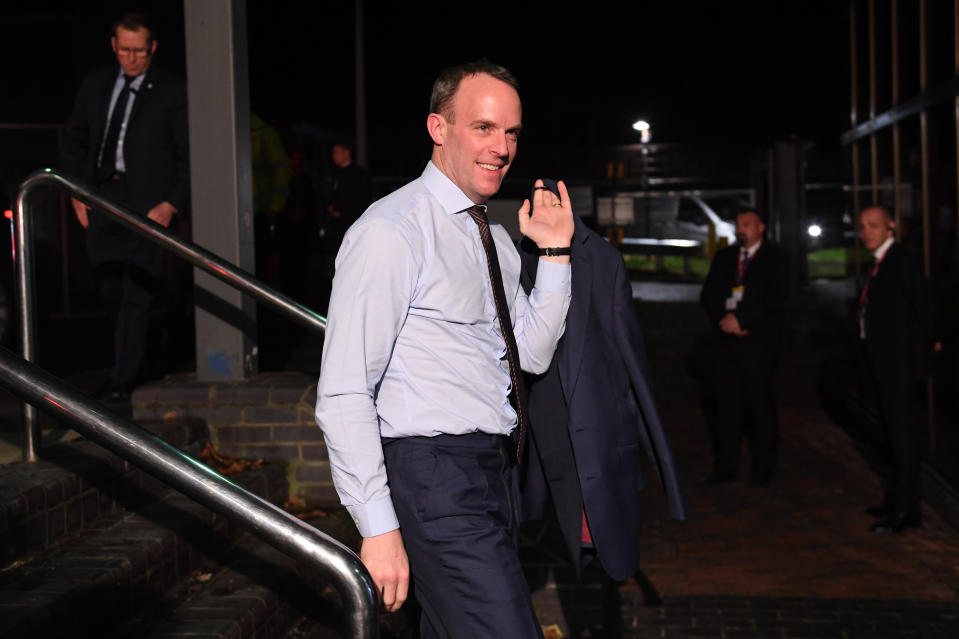These seats will decide whether Boris Johnson gets a majority

A major poll last night outlined the seats that will decide the outcome of tomorrow’s general election – with the Conservatives on course for a small majority of 28.
YouGov’s data shows the Tories winning 339 seats, 22 more than in 2017, with a total vote share of 43%.
Labour is set to win 231 seats, down from 262 in 2017, with 34% of the vote.
The seat-by-seat “MRP”-style poll, which correctly predicted a hung parliament at the last election, has a margin of error that includes the possibility that Boris Johnson falls just short of a majority.
“Like all predictions our model comes with some uncertainty, and the margin of error here could put the final number of Conservative seats from 311 to 367,” YouGov states.
“This means that we absolutely cannot rule out the 2019 election producing a hung Parliament – nor can we rule out a larger Conservative majority.”
The MRP data shows a number of key “toss-up” seats that could swing to one of at least two parties. These include:
Esher and Walton: Foreign secretary Dominic Raab could lose this seat to the Liberal Democrats, with whom the poll puts him practically neck and neck. Commentators have speculated that this could produce a “Portillo moment” on election night, in which a major figure in a party is ousted.

Kensington: The Tories may fail to take back this London constituency – once held by ex-foreign secretary Sir Malcolm Rifkind – from Labour’s Emma Dent Coad. She is polling narrowly ahead, with the Liberal Democrats further back in third, suggesting a Remain vote split.
Dagenham and Rainham: A straight head-to-head between the Tories and Labour, with the Brexit Party polling further back in third – suggesting a split in the Leave vote.
Great Grimsby: Further signs of Nigel Farage’s Brexit Party disrupting the Conservatives, with Boris Johnson’s party polling narrowly ahead of Labour but the Brexit Party estimated to take 11% of the vote.
Bradford South: The Tories will be hoping to attract Brexit Party voters here too. The Labour and Tory candidates are way out in front but both could be bolstered if Brexit and Liberal Democrat supporters vote tactically.
Neighbouring Bolton North East and Bury North also show that the Tories could benefit if Brexit Party votes transfer to them.
Sedgefield: The Conservatives are very narrowly ahead of Labour in YouGov’s poll estimate here in Tony Blair’s former constituency, but the Brexit Party is potentially set to take 12% of the vote
Hendon: In a seat that’s typically hotly contested between the Tories and Labour, Conservative Matthew Offord will be hoping to hold on to bolster Boris Johnson’s potential majority.
Lincoln: Labour’s Karen Lee will hope to hold off the challenge from previous Tory MP Karl McCartney in this marginal. She is polling one percentage point ahead.

East Devon: The Conservatives could lose this seat to an independent candidate, Claire Wright, whose polling figures are identical to those of the Tory candidate Henry Gent.
Bedford: YouGov shows both main parties’ candidates here on 43%, but Labour will hope to take some of the estimated 8% of voters backing the Liberal Democrats.
Wolverhampton South West and Gedling have the Tories and Labour within a whisker of each other.
In Scotland, each of Labour, the Conservatives and the Liberal Democrats are in a straight fight with the SNP in at least one of 10 seats across the country, including Ayr Carrick and Cumnock, Rutherglen and Hamilton West and North East Fife.
And in Wales, Delyn, Wrexham, Vale of Clwyd, Clwyd South, and Aberconwy are all neck-and-neck between Labour and the Conservatives.
Ynys Mon is also a three-way fight between Labour, Plaid Cymru and the Tories.

 Yahoo News
Yahoo News 
